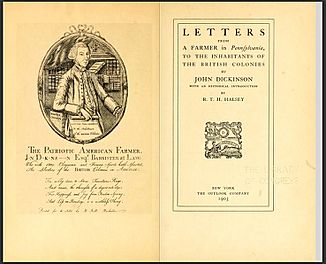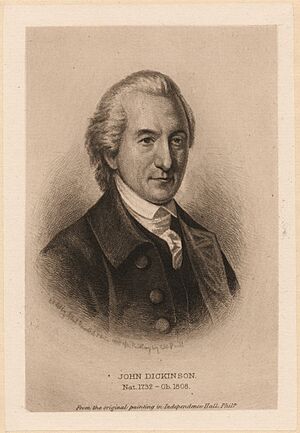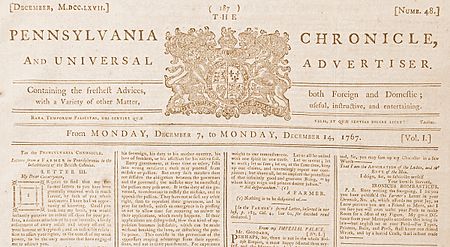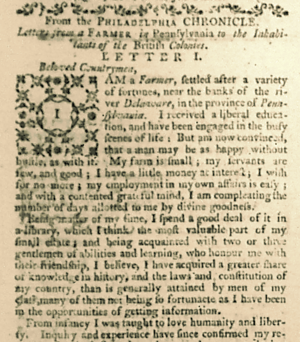Letters from a Farmer in Pennsylvania facts for kids

Frontispiece and title page of a 1903 reprint of the letters
|
|
| Author | John Dickinson |
|---|---|
| Country | British Empire |
| Language | English |
| Published | December 1767 – April 1768 |
| Text | Letters from a Farmer in Pennsylvania, to the inhabitants of the British Colonies at Wikisource |
Letters from a Farmer in Pennsylvania was a series of important essays. They were written by a lawyer named John Dickinson between 1767 and 1768. He used the pen name "A Farmer". These twelve letters were read by many people. They helped unite the American colonists against the Townshend Acts. This was a big step towards the American Revolution.
Many historians say these letters had a huge impact. Only Thomas Paine's Common Sense in 1776 had a similar effect. The success of the Letters made John Dickinson very famous.
The letters are written from the point of view of a fictional farmer. This farmer is described as humble but smart. He is like an American Cincinnatus. The letters present a clear argument about the British government. They said that the British Parliament could control trade in the colonies. But it could not tax the colonies just to make money. This idea became central to how colonists opposed the Townshend Acts. It also shaped how they thought about their relationship with Britain. The letters used a calm tone. They encouraged colonists to solve problems within the British system. The "farmer" character became a symbol of good values. He was used in many American political writings later on.
Why the Letters Were Written
In the 1760s, the rules for how Britain and its colonies worked together were unclear. Many people in Britain believed that the British Parliament had all the power. This idea was written down by William Blackstone in his book Commentaries on the Laws of England. He said there must be one supreme power in any government.
However, the colonies and their local governments had always managed their own affairs. This was especially true for taxes. After Britain won the Seven Years' War in 1763, they decided to keep soldiers in North America. Britain had a large debt from the war. They wanted the colonies to help pay for these soldiers.
In 1765, Britain passed the Stamp Act. This law taxed many printed items in the colonies. It caused a big argument about Parliament's right to tax the colonies. American colonists protested the Stamp Act. They boycotted British goods. This hurt British businesses. Some British politicians, like William Pitt, also opposed it.
In 1766, Parliament canceled the Stamp Act. But at the same time, they passed the Declaratory Act. This act said that Parliament still had the right to tax the colonies. In 1767, Parliament put import duties on goods brought into the colonies. These were called the Townshend Acts. These new taxes restarted the debate about Parliament's power.
John Dickinson was a rich lawyer from Philadelphia. He was also a member of the Pennsylvania assembly. He helped write the Declaration of Rights and Grievances in 1765. After the Townshend Acts were passed, Dickinson wrote his Letters. He wanted to explain Parliament's power to tax the colonies. He also wanted colonists to take calm actions against the Townshend Acts. The Letters were first printed in the Pennsylvania Chronicle. Then, most newspapers in the colonies reprinted them. They were even reprinted in London, Paris, and Dublin.
What the Letters Said
Even though John Dickinson was a lawyer, his first letter introduced him as a farmer. He said he lived "near the banks of the river Delaware, in the province of Pennsylvania." He explained that he learned a lot about history and law from his library. Then, he started talking about the growing problems between Britain and the colonies.
Dickinson agreed that the British Parliament had power over the whole British Empire. But he argued that the colonies had the right to tax themselves. British officials thought colonists would accept "external" taxes, like import duties. They believed colonists would not accept "internal" taxes, like the Stamp Act.
However, Dickinson argued that any tax from Parliament meant to raise money, not just to control trade, was unconstitutional. He said the Townshend Acts were meant to raise money. So, even though they were import duties, they were still wrong.
This idea meant that power in the British Empire was divided. Parliament's power was limited in some areas, like taxing the colonies. Local colonial assemblies had power in other areas. Dickinson also said the King had power to cancel colonial laws. But Parliament did not. These ideas were very different from what most British people believed. They thought power should be central and undivided. After Dickinson's Letters, American colonists' views changed quickly. They increasingly rejected Parliament's power over them.
The Townshend Acts did not tax the colonies very much. But Dickinson argued that these taxes were meant to set a rule. This rule would say Parliament could tax the colonies. He warned that if colonists accepted this rule, much larger taxes would follow.
Nothing is wanted at home but a PRECEDENT, the force of which shall be established by the tacit submission of the colonies [...] If the parliament succeeds in this attempt, other statutes will impose other duties [...] and thus the Parliament will levy upon us such sums of money as they choose to take, without any other LIMITATION than their PLEASURE.
Dickinson also said that any cost forced on the colonies by Parliament was a tax. For example, the Quartering Act of 1765 made colonies pay for British soldiers. Dickinson saw this as a tax. He disagreed with the New York assembly's choice not to follow the act. But he believed they had the right to refuse. He criticized Parliament for ordering the assembly to dissolve.
Even though he disagreed with Parliament's right to tax, Dickinson agreed with its power over trade. He believed the colonies and Britain shared common interests.
[T]here is no privilege the colonies claim, which they ought, in duty and prudence, more earnestly to maintain and defend, than the authority of the British parliament to regulate the trade of all her dominions. Without this authority, the benefits she enjoys from our commerce, must be lost to her: The blessings we enjoy from our dependance on her, must be lost to us; her strength must decay; her glory vanish; and she cannot suffer, without our partaking in her misfortune.
Dickinson did not explain in detail how Britain and the colonies should relate. But he warned against separating from Great Britain. He predicted bad things for the colonies if they became independent.
Torn from the body, to which we are united by religion, liberty, laws, affections, relations, language, and commerce, we must bleed at every vein.
Dickinson saw that future conflict was possible. But he warned against using violence. He said it should only be a last resort.
If at length it becomes undoubted that an inveterate resolution is formed to annihilate the liberties of the governed, the English history affords frequent examples of resistance by force. What particular circumstances will in any future case justify such resistance can never be ascertained till they happen. Perhaps it may be allowable to say generally, that it never can be justifiable until the people are fully convinced that any further submission will be destructive to their happiness.
Instead, Dickinson urged colonists to find solutions within the British system. To get the Townshend duties removed, he suggested more petitions. He also proposed putting pressure on Britain by buying fewer imports. This could be done by being careful with money and buying local goods.
The ideas in the Letters are often linked to Whig political thought. The letters highlight several Whig ideas. These include the danger of too much power, being careful of standing armies, and the idea that small steps can lead to big problems. They also suggest a plot against freedom.
Dickinson used the Whig idea of "slavery." In the 1700s, Americans used this word to mean being controlled by someone else's will. The Letters quoted speeches by Whig politicians William Pitt and Charles Pratt. They both said that being taxed without having a say was like slavery. Letter VII concluded: "We are taxed without our own consent given by ourselves, or our representatives. We are therefore—I speak it with grief—I speak it with indignation—we are slaves."
Writing Style
The Letters were written in a calm tone. Dickinson told his fellow colonists, "Let us behave like dutiful children who have received unmerited blows from a beloved parent." One historian said Dickinson "informed men's minds as to the constitutional issues but left their passions unmoved."
Dickinson's writing style is often compared to Thomas Paine's Common Sense. Dickinson used careful arguments. Paine used strong, emotional words. This difference shows how the conflict between Britain and the colonies grew over time. It also shows how political views changed in the colonies.
Dickinson's style is like the English writer Joseph Addison. Paine's style is like Jonathan Swift. Dickinson's Letters focused more on immediate political problems. They were less about big ideas of government. The character of "the farmer" was like a political thinker. He thought about politics, law, and history in his countryside library.
The Letters used many classical themes. This was common in writings at the time. Dickinson often quoted old writers like Plutarch, Tacitus, and Sallust. He often compared the colonies' situation to ancient history. For example, the second letter compared Carthage's use of import duties to Britain's taxes. Each of the twelve letters ended with a Latin saying. This was meant to capture the main message. The last letter ended with a quote from Sallust's Jugurthine War:
Certe ego libertatem, quae mihi a parente meo tradita est, experiar; verum id frustra an ob rem faciam, in vestra manusitum est, quirites.
"For my part, I am resolved strenuously to contend for the liberty delivered down to me from my ancestors; but whether I shall do this effectually or not, depends on you, my countrymen."
The farmer was described as a simple man who didn't care about being rich. This would remind readers of classical figures like Cincinnatus. He was a farmer from Virgil's Georgics. It also brought to mind the idea of the golden mean from Horace.
 | Laphonza Butler |
 | Daisy Bates |
 | Elizabeth Piper Ensley |




